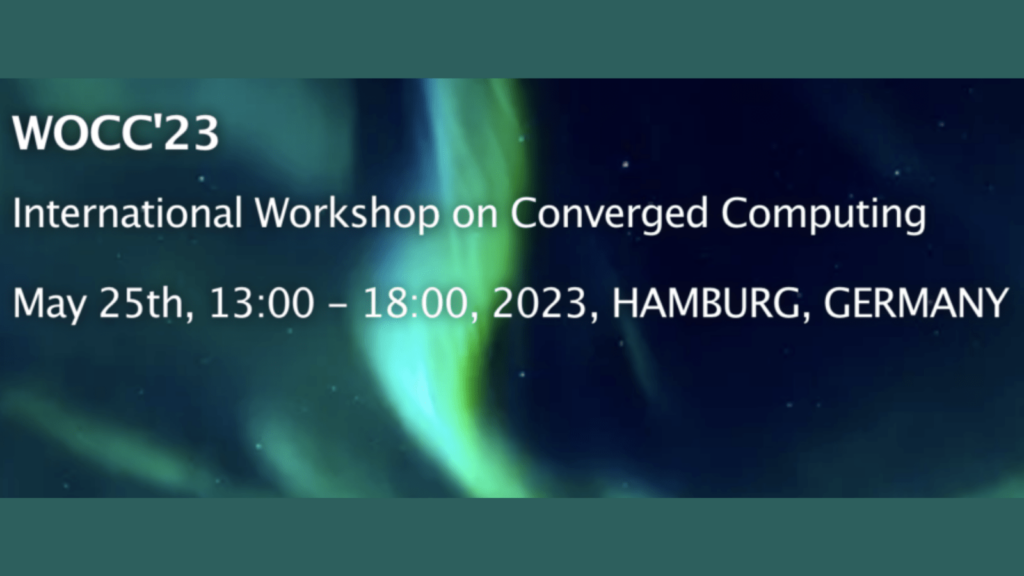WOCC’23 – International Workshop on Converged Computing
Introduction
The landscape of scientific computing is changing rapidly as complex, multi-stage pipelined workflows that combine traditional HPC computations with large-scale data analytics and AI are becoming increasingly common. These next-generation workflows seek to improve the efficiency and scale of traditional HPC simulations and apply large-scale and distributed computing to domains with high societal impact, such as autonomous vehicles, precision agriculture, or smart cities. Such complex workflows are expected to require the coordinated use of supercomputers, cloud data centres, and edge-processing devices, leading to an era of Converged Computing that combines the best of these worlds.
Cloud computing technologies are gaining prevalence in HPC due to their benefits of resource dynamism, automation, reproducibility, and resilience. Similarly, HPC technologies for application performance optimisation and sophisticated scheduling of complex resources are being integrated into modern cloud infrastructures. However, the convergence of HPC and cloud also raises new challenges in resource management, data transfers, storage and throughput. Modern cloud and HPC frameworks provide heterogeneous resources, including processors and accelerators, diverse types of memories and storage, and network links, to match the diversity in workloads. Similarly, cloud technologies for elasticity, resilience, and multi-tenancy need to be adopted in HPC while ensuring high performance and throughput. Converged software stacks will need to provide middleware and resource management to facilitate the use of heterogeneous hardware components, improve system utilisation, and provide seamless interfaces for users and application developers.
The First Workshop on Converged Computing (WOCC’23) will provide the edge, HPC and cloud communities a dedicated venue for discussing challenges and research opportunities, deployment efforts, and best practices in supporting complex workflows on the coordinated use of supercomputers and cloud data centres as well as edge-processing devices. The workshop encourages interaction between participants developing applications, algorithms, middleware and infrastructure for converged environments. The workshop will be ideal for the community to define the current state-of-the-art, and identify fundamental challenges and feasible future technologies and techniques. The workshop aims to start a discussion on questions, including:
- what changes to architecture, hardware, and middleware designs (including hardware monitoring, operating systems, system software, and resource management) are needed?
- How to monitor and collect system-level metrics for utilisation to identify bottlenecks to meet the different targets in performance, cost, and power budget?
- How to support different coupling patterns (e.g., loose or tight) between traditional scientific and big-data/AI components?
- What complex workflows and workloads leverage heterogeneity, elasticity, and dynamic resources provisioning?
Important Dates
- Paper Submission – Mar 25, 2023
- Author Notifications – Apr 10, 2023
- Camera Ready Papers – June 10, 2023, including Copyright Form
- Workshop day – May 25, 2023
Organisers
- Ivy Peng (KTH Royal Institute of Technology, Sweden)
- Tapasya Patki (Lawrence Livermore National Laboratory, USA)
- Daniel Milroy (Lawrence Livermore National Laboratory, USA)
Program Committee
- Jae-Seung Yeom, Lawrence Livermore National Laboratory, USA
- Andrew Younge, Sandia National Laboratory, USA
- Jeff Vetter, Oak Ridge National Laboratory, USA
- Nathan Tallent, Pacific Northwest National Laboratory, USA
- Bill Magro, Google, USA
- Martin Schulz, Technische Universität München, Germany
- Jesus Carretero, Universidad Carlos III de Madrid, Spain
- Domenico Talia, University of Calabria, Italy
- Estela Suarez, Julich Supercomputing Centre, Germany
- Erwin Laure, Max Planck Computing and Data Facility, Germany
- Jakob Luettgau, University of Tennessee Knoxville, USA
- Kento Sato, Riken, Japan
- Claudia Misale, IBM, USA
- Yoonho Park, IBM, USA
Topics of Interest
We invite both short paper (8 pages single column) or full papers (12 pages single column) of original works. Accepted papers will be included in the post-conference proceedings in Springer’s Lecture Notes in Computer Science (LNCS). We encourage works related to the following topics and accept other related topics.
- Experience and best practices of converged computing of cloud, edge, and HPC
- Resource and job management software
- Architectures, networks, and storage
- Software stack, middleware, and infrastructure
- Advanced models for expressing system resources
- Scheduling, resource allocation, and adaptation
- Complex workflows, including HPC, Machine-Learning, and Data Analytics components
- Early results and evaluation of porting HPC applications to clouds
- Elasticity and scalability amid resource heterogeneity
- Virtualization, containers, container runtimes, and container orchestration frameworks
- Scalable and elastic storage and I/O data management services and architectures
- Resilience, fault tolerance, and reliability in converged computing environments
- Early results of leveraging cloud techniques (e.g., Kubernetes, cloud databases) for HPC applications
- System- and application-level resource monitoring and optimisation techniques and tools
Submission
EasyChair Submission Site is Open! https://easychair.org/conferences/?conf=wocc23
Paper submissions must be formatted using LNCS style (see Springer’s website and adhere to the following guidelines:
Use single-column format Text can be short paper (8 pages single column) or full paper (12 pages single column) of original works (including figures and references) with two possible extra pages after the review to address the reviewer’s comments. Use Springer’s LaTeX document class or Word template (see Springer’s Proceedings Guidelines). Papers must be suitable for double-blind review (see ISC High Performance Double-Blind Review Guidelines). Papers submitted to be included in the proceedings should not have been previously published or under review for a different venue Note that membership on a program committee does not inherently create a conflict of interest to submit a paper.
Review Process
Each paper is expected to receive a minimum of 3 reviews. Double-blind peer-review will be used. Papers will be evaluated based on novelty, technical soundness, clarity of presentation, and impact. The Research Paper Committee reserves the right to reject incorrectly formatted papers.


